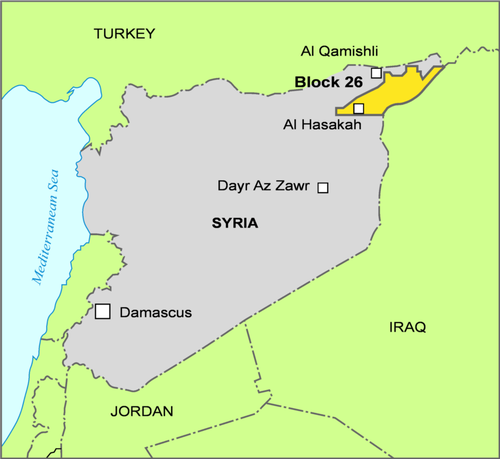GULFSANDS continues to pioneer Project Hope, a Humanitarian and Economic Stimulus Initiative whereby, with co-ordinated international support, international energy companies would return to operations in northeast Syria, where oilfields are located. Under this initiative, apportioned revenues from oil sales would be deposited in an independently administered fund, and disbursed to finance early recovery, humanitarian, economic, employment and security projects across the country – for the benefit of all Syrian people, including those returning to their home country, and in accordance with relevant UN Security Council resolutions.
GULFSANDS has launched a new video which shows the difference that can be made by this initiative.
The video highlights that the current state of the oil and gas industry is unlawful and unsustainable. It benefits a small group of black marketeers, fuels the war economy, causes devastating environmental damage and pollution, and permanent damage to the oil fields themselves. If this is allowed to continue, there may be no legacy left for the Syrian people.
GULFSANDS believes there is another way.
Through Project Hope, oil and gas operations in Syria can be cleaned-up, legitimised and production increased significantly. A revitalised industry – with appropriate oversights - could result in gross revenue of around $15 billion per year.
Resulting profits can be reinvested into areas including:
- Environmental Clean-Up;
- Infrastructure Development;
- Electricity and Water;
- Education and Youth Employment;
- Communication and Roads; and
- Healthcare and Medicine.
GULFSANDS encourages an open dialogue as we continue to develop this important initiative, and welcomes any thoughts, insights, or suggestions.
Watch the video here.

Syria – Block 26
Gulfsands is the operator of the Block 26 PSC and holds a 50% working interest in the Production Sharing Contract (“PSC”) along with Sinochem (50% working interest). The Group is not presently involved in any production or exploration activities on Block 26 as force majeure has been declared in respect of the contract following the introduction of UK sanctions against Syria.
The Group has ensured that it remains compliant with all applicable sanctions in relation to Syria and intends to return to production and exploration activities as soon as permitted.
Block 26 covers an area of 5,414 km² in north east Syria and the PSC grants rights to explore, develop and produce hydrocarbons from all depths outside the pre-existing fields within the area and from the deeper stratigraphic levels below the pre-existing discovered fields. The final exploration period of the PSC was set to expire in August 2012 when force majeure was declared in December 2011. It is anticipated that an extension in the exploration period can be negotiated with the Syrian authorities to at least replace that period of time which was remaining when force majeure was declared. Rights to the benefits of production from discovered fields last for a minimum of 25 years from the date of development approval with extension of a further 10 years thereafter available at the partners’ option.
Under the Group’s operatorship, two oil fields containing reservoirs of Cretaceous age have been discovered and developed within the PSC area, Khurbet East (2008) and Yousefieh (2010). During 2011 combined production from these fields reached a level of just under 25,000 barrels of oil per day (“bopd”) before the impact of UK sanctions resulted in the curtailing of production levels. In addition, two further oil and gas discoveries with reservoirs of Triassic age have been identified beneath the Cretaceous aged oil producing reservoir in the Khurbet East field and within the Kurrachine and Butmah Dolomite formations. Development approvals for these discoveries were granted in 2008 and 2011 respectively. A further oil discovery was made late in 2011 by Gulfsands in the Cretaceous aged reservoirs at the Al Khairat exploration well, this discovery awaits further evaluation and development work.
The operation of these fields during the production phase is undertaken by Dijla Petroleum Corporation (“DPC”), a joint operating company formed between Gulfsands, Sinochem and General Petroleum Corporation (“GPC”) for this purpose, to which staff of both Gulfsands and GPC had previously been seconded. Since the introduction of UK sanctions on 1 December 2011 and the subsequent declaration of force majeure under the PSC, Gulfsands has had no involvement with the operations of DPC, and Gulfsands staff seconded to DPC have been withdrawn, leaving DPC under the management of GPC secondees.
Strategy for Block 26
Block 26 could be proven to contain over a billion barrels of recoverable resource.
Gulfsands’ core Syria strategy is to Protect and Preserve its rights related to Block 26 and to Prepare for re-entry into Syria and a return to operations. While the Block 26 PSC remains in force majeure due to applicable sanctions, Gulfsands undertakes its re-entry planning in a strict observance of applicable sanctions and laws.
Gulfsands builds ESG and sustainability considerations into all its re-entry planning, as well as respecting the UN Security Council Resolution 2254, which appears to be the accepted blueprint for a Future Syria. It also maintains compliance with all local laws to protect its rights under its PSC while it remains in force majeure.
The Board believes, and an independant Competent Persons Report (“CPR”) has confirmed, that upon re-entry, on a gross basis, Block 26 could be proven to contain over a billion barrels of recoverable resource with the potential for production levels of around 50,000 boepd from existing discoveries in the near term, and over 100,000 boepd from a full block development incorporating the potential exploration upside.
KeyFacts Energy: Gulfsands Petroleum Syria country profile
 KEYFACT Energy
KEYFACT Energy